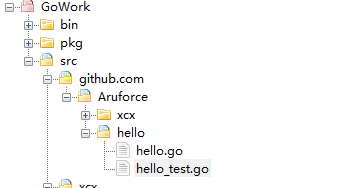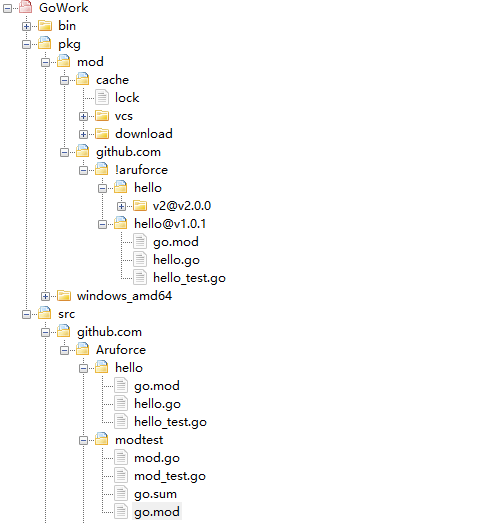1. Create a mudule and publish it
1.1 $GOPATH/src directory structure

1.2 Environment Variables
Need to add environment variable: GO111MODULE=on;
This variable has three optional values:
- On (GoEnable this feature anywhere),
- off (disable this feature),
- auto (default, enabled elsewhere with GOPATH disabled)
Otherwise console will output the next step
go: modules disabled inside GOPATH/src by GO111MODULE=auto; see 'go help modules'
1.3 Enter the hello directory
Execute command: go mod init github.com/Aruforce/hello
console output: go: create new go.mod: module github.com/Aruforce/hello
Add a file go.mod:
module github.com/Aruforce/hello go 1.12 //go version
1.4 Add code
hello.go:
package hello func Hello() string { return quote.Hello(); }
hello_test.go
package hello import "testing" func TestHello(t *testing.T) { want := "Hello, world." if got := Hello(); got != want { t.Errorf("Hello() = %q, want %q", got, want) } }
1.5 Release
1.5.1 Release
git add * //Add Files git commit -m 'first commit' //Notes git remote add origin https://github.com/Aruforce/hello.git //Add remote warehouse git push -u origin master //Push
1.5.2 tag and Push
git tag v1.0.0 //Note that this format is prescribed by Go and is v(major). (minor).(patch) git push --tags //Push tag git checkout -b v1 //Check out v1 branch to prevent BUG s from being modified git push -u origin v1 //Pushing empty content to branch v1 means creating a new branch remotely
2. Use the above module in a new project
2.1 Directory Structure

2.2 Code File
mod.go:
package modtest import ( "fmt" "github.com/Aruforce/hello" ) func Mod() string{ return hello.Hello(); }
mod_test.go:
package modtest import "testing" func TestMod(t *testing.T) { want := "Hello, world." if got := Mod(); got != want { t.Errorf("Mod() = %q, want %q", got, want) } }
2.3 Initialization Project
go mod init github.com/Aruforce/hello
2.4 Download Dependent Code
Command:
go get // download code, etc. in the $GOPATH/pkg/mod directory
console:
go: finding github.com/Aruforce/hello v1.0.0 go: downloading github.com/Aruforce/hello v1.0.0 go: extracting github.com/Aruforce/hello v1.0.0
go.mod:
module github.com/Aruforce/modtest go 1.12 require ( github.com/Aruforce/hello v1.0.0 // Because there is no information about the specified version and so on in the code, the code we refer to has published v1.0.0, //go get pulls out the code for the maximum version number in the v1.x.x tag list; //If tag go is not published, it will fake version number v0.0.0-time-commit code //This code is (commit hashcode of the last master when the code is first pulled out), //Then pull the substitution codes, except that go does not actively update these codes when it is built unless we actively request updates such as go get -u // When you see this file, you can actually modify the version number manually, without using any go get-u patch... )
go.sum:
github.com/Aruforce/hello v1.0.0 h1:CNC4ZenBDAah3mib7fwBztu9ZHVYkjNzMAKMhKlLreQ= //Project Version github.com/Aruforce/hello v1.0.0/go.mod h1:SPJXz6EybRNTFDg7RAoekS+HdftZtWbdXaa8W+Mr8YM= //The module itself goes.mod file MD5 value as a security check
2.5 hello version update causes modtest to be updated as well
2.5.1 minor or pacth updates
There's only one thing we need to do
go get -u //perhaps go get -u =patch //This will only upgrade one patch if there is v1.0.0 v1.0.1 v1.0.2 This will only download v1.0.1 code after execution. //perhaps go get github.com/Aruforce/hello@v1.0.2 //This is to download the specified version code
2.5.2 major update
It looks like Major's updates depend on different things, but I don't think it's useless, because to keep a code compatible, the safest way to do this is not to modify the old API, which is the open and close principle: APIs only allow additions, not modifications;
2.5.2.1 Requires a single code base at the same time, in case of version conflict
See the following code
package modtest import ( "fmt" "github.com/Aruforce/hello" // v1 version hv2 "github.com/Aruforce/hello/v2" //v2 is equivalent to a completely new dependency on go. Whether the alias given by golang or hello for the path of this pattern is a conflict on the original version's name requires a special declaration, that is, a conflict resolution // When you go get and so on, you download the code for v2.x.x ) func Mod() string{ fmt.Println(hv2.Hello()); return hello.Hello(); }
2.5.2.2 Direct major upgrade scenario
See the following code:
package modtest import ( "fmt" "github.com/Aruforce/hello/v2"//v2 is a completely new dependency on go, and the alias given by golang to the path of this pattern is hello, which makes it impossible to modify your code at all //When go get, etc., the code for v2.x.x maximum version number is downloaded ) func Mod() string{ fmt.Println(hv2.Hello()); return hello.Hello(); }
2.5.2.3 and circumstances not related to us
See the following code
package modtest import ( "fmt" "github.com/Aruforce/hello" // v1 version //In this case, minor patch updates will not affect as long as we don't go get -u manually //Large version updates, even go get-u will not update to large version, unless life is shown //The rest is to use the new version you specified ) func Mod() string{ return hello.Hello(); }
3. Remove unwanted dependencies
Since the go build does not actively remove unwanted dependencies, we will manually remove them by executing the following commands
go mod tidy
4. No concept of a local warehouse was found for go module
Maybe not. How big is the text document... and people don't have walls either.
5. Hopefully the go module will settle down as a fixed feature...vendor seems to be abandoned...
6. I feel worse than maven for the following reasons:
- maven was the first to develop the test deployment process and rely on coordinated standards, while maven and jar central warehouse are just standard practices; go mod feels like a small shell script that can't even be practiced;
- go has too many built-in conventions to modify and is mixed with the compiler
- You haven't seen a plug-in for resource file processing so far (this may not be necessary (... you don't have to follow the environment to configure the file)
- The document is too crude